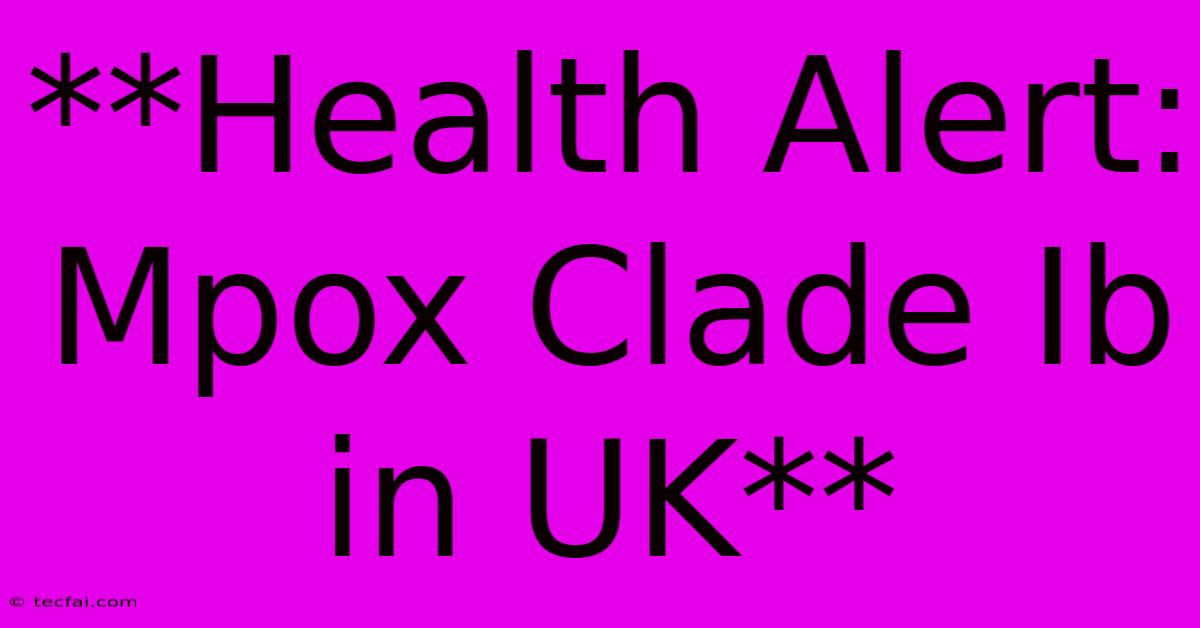**Health Alert: Mpox Clade Ib In UK**

Discover more detailed and exciting information on our website. Click the link below to start your adventure: Visit Best Website tecfai.com. Don't miss out!
Table of Contents
Health Alert: Mpox Clade Ib in UK - What You Need to Know
The UK has recently reported a rise in cases of mpox (formerly known as monkeypox), specifically linked to Clade Ib, a genetic variant of the virus. While this news might sound concerning, understanding the situation and taking appropriate precautions is key.
What is Mpox Clade Ib?
Mpox Clade Ib is a distinct genetic lineage of the mpox virus. While similar to other strains in causing mpox, it has been observed to have different transmission patterns and potential severity.
What are the Symptoms of Mpox?
Mpox symptoms typically appear within 3 weeks of exposure and can include:
- Fever
- Headache
- Muscle aches
- Backache
- Swollen lymph nodes
- Rash - starting as flat lesions that develop into raised bumps, eventually filling with pus. This rash can appear on the face, hands, feet, mouth, genitals, and anus.
How is Mpox Transmitted?
Mpox can be spread through:
- Close contact with an infected person, including physical contact, sexual contact, and contact with contaminated materials like bedding.
- Contact with an infected animal - mainly rodents in Africa.
- Respiratory droplets during prolonged face-to-face contact.
Who is at Risk?
While anyone can contract mpox, some groups may be at increased risk:
- Men who have sex with men - the current outbreak has disproportionately affected this group.
- Healthcare workers - due to potential exposure to infected patients.
- People with weakened immune systems - who may be more susceptible to severe illness.
What are the UK Authorities Doing?
The UK Health Security Agency (UKHSA) is closely monitoring the situation and actively working to:
- Identify and isolate cases to prevent further transmission.
- Provide guidance and support to individuals who are at risk or have been exposed to the virus.
- Develop and implement public health campaigns to increase awareness and encourage safe practices.
How Can You Protect Yourself?
Taking precautions can significantly reduce your risk of contracting mpox:
- Practice good hygiene - wash your hands regularly with soap and water, especially after close contact with others.
- Avoid close contact with people who have a rash or other symptoms suggestive of mpox.
- Use condoms during sexual activity.
- Get vaccinated - if you are eligible, vaccination is a key strategy for protection.
- Seek medical attention immediately if you develop any symptoms consistent with mpox.
The Importance of Staying Informed
As with any emerging health threat, staying informed is crucial. Follow reliable sources of information like the UKHSA and the World Health Organization (WHO) for the latest updates and guidance.
Remember, while mpox can be concerning, the information and resources available can help you stay safe and make informed decisions.

Thank you for visiting our website wich cover about **Health Alert: Mpox Clade Ib In UK**. We hope the information provided has been useful to you. Feel free to contact us if you have any questions or need further assistance. See you next time and dont miss to bookmark.
Featured Posts
-
Trump Eu Leaders Seek Common Ground
Nov 06, 2024
-
Jobs Data Rate Cut Still Expected
Nov 06, 2024
-
Uk Identifies Mpox Clade 1b In Household
Nov 06, 2024
-
10 Man City Suffer Uefa Youth League Loss To Sporting
Nov 06, 2024
-
Bitcoin Surges To 75 000 After Trump Win
Nov 06, 2024
